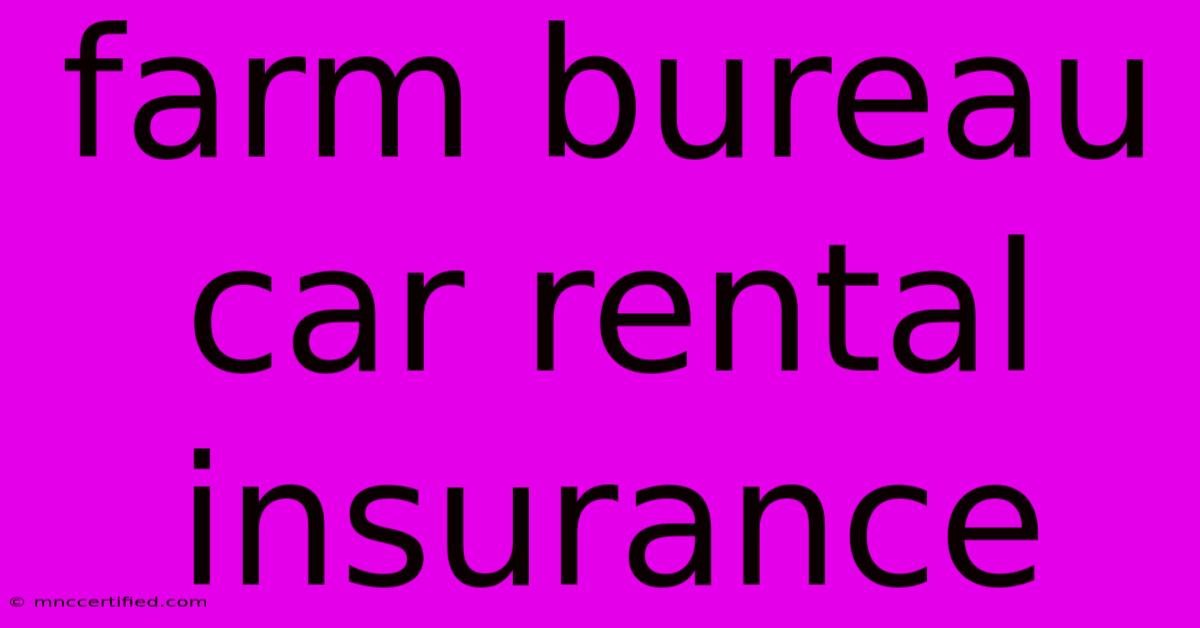Farm Bureau Car Rental Insurance

Table of Contents
Farm Bureau Car Rental Insurance: Is it Worth It? A Comprehensive Guide
Renting a car can be exciting, but the thought of potential damage or accidents can quickly dampen the mood. That's where rental car insurance comes in. If you're a Farm Bureau member, you might be wondering if their car rental insurance is the right choice for you. This comprehensive guide will help you understand Farm Bureau's offerings, compare them to other options, and ultimately decide if it's worth the investment.
Understanding Farm Bureau's Auto Insurance and Rental Car Coverage
Farm Bureau, known for its strong presence in agricultural communities but extending nationwide, offers a range of auto insurance policies. The specifics of rental car coverage vary depending on your existing Farm Bureau auto insurance policy. It's crucial to check your policy documents carefully to understand exactly what coverage you have. Many policies offer some level of secondary coverage for rental vehicles, meaning it kicks in after your primary insurance (like your personal auto policy) is exhausted.
What Farm Bureau Might Cover:
- Collision Damage Waiver (CDW): This covers damage to the rental car, often with a deductible. Farm Bureau's involvement may reduce this deductible or provide supplemental coverage.
- Liability Coverage: This protects you against claims from third parties if you cause an accident in a rental car. Your Farm Bureau policy's liability limits likely extend to rentals.
- Uninsured/Underinsured Motorist Coverage: This is crucial if you're involved in an accident caused by an uninsured or underinsured driver. Again, this coverage may extend to rentals, but the specifics depend on your policy.
What Farm Bureau Likely Won't Cover:
- Personal belongings: Farm Bureau auto insurance generally doesn't cover items stolen or damaged from inside the rental car.
- Loss of use: This covers the rental company's losses while the vehicle is being repaired. This is usually a separate purchase from the rental company.
Comparing Farm Bureau Car Rental Insurance to Other Options
Before relying solely on your Farm Bureau policy, consider these alternatives:
- Your Credit Card: Many credit cards offer rental car insurance as a benefit. Check your card's terms and conditions – this coverage often automatically applies when you pay for the rental with that card. This is frequently primary coverage, unlike Farm Bureau's likely secondary coverage.
- Third-Party Rental Insurance: Companies specialize in providing rental car insurance. These policies can often offer more comprehensive protection than what's included in your Farm Bureau auto policy.
- Declining the Rental Company's Insurance: Rental companies aggressively push their insurance, often at inflated prices. Weigh the cost and coverage carefully before purchasing this option, especially if you have adequate coverage elsewhere.
Is Farm Bureau's Car Rental Insurance Worth It?
The answer depends entirely on your individual circumstances and existing insurance coverage. Consider these factors:
- Your existing Farm Bureau auto policy: Scrutinize your policy details. You might already have sufficient coverage.
- Your credit card benefits: Check your credit card agreement to see what rental car protection is included.
- The cost of Farm Bureau's supplemental coverage (if offered): Weigh the premium against the potential cost of damages.
- Your risk tolerance: How comfortable are you with the financial risk of potential accidents or damage?
Pro Tip: Always obtain a copy of your rental agreement and take photos of the vehicle's condition before driving away. This provides valuable documentation in case of disputes.
Keywords for SEO Optimization:
- Farm Bureau car rental insurance
- Farm Bureau auto insurance rental car coverage
- Rental car insurance comparison
- Credit card rental car insurance
- Is Farm Bureau rental car insurance worth it?
- Car rental insurance cost
- Farm Bureau insurance review
- Collision Damage Waiver (CDW)
- Liability coverage rental car
- Uninsured/Underinsured motorist coverage rental car
By carefully reviewing your existing insurance policies, comparing options, and understanding the potential risks, you can make an informed decision about the best car rental insurance for your needs. Remember to always read the fine print and ask questions if anything is unclear.

Thank you for visiting our website wich cover about Farm Bureau Car Rental Insurance. We hope the information provided has been useful to you. Feel free to contact us if you have any questions or need further assistance. See you next time and dont miss to bookmark.
Featured Posts
-
Suits La Harveys Return Confirmed
Nov 21, 2024
-
Galaxy Fox Coin Price Prediction
Nov 21, 2024
-
Aca Health Insurance Jobs Remote
Nov 21, 2024
-
Cheap E And O Insurance For Notaries
Nov 21, 2024
-
National Trust Insurance Company
Nov 21, 2024